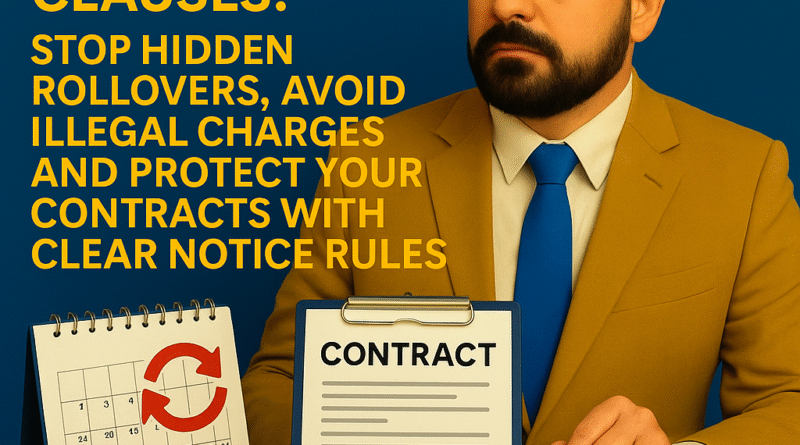Automatic Renewal Clauses: Stop Hidden Rollovers, Avoid Illegal Charges and Protect Your Contracts with Clear Notice Rules
Understand how automatic renewal and notice rules work, avoid surprise contract extensions, cut illegal fees, and keep full control over your obligations.
You’ve probably seen it: “Renews automatically unless cancelled.” Easy to ignore at signing, painful later when a lease,
service contract, SaaS subscription or maintenance agreement quietly rolls over for another term — with higher prices or
early termination penalties. Many businesses rely on inertia; many consumers and even sophisticated clients
don’t track renewal dates or legal notice requirements. The result: unwanted obligations, chargebacks, and disputes
that could have been avoided with a few clear clauses and a calendar reminder. This guide shows you
how automatic renewal clauses actually work, when they’re restricted by law, what notices are required, and how to draft or review them
to protect both sides.
Auto-renewal is valid when clear, conspicuous and compliant with state “automatic renewal” laws and notice rules.
Hidden rollovers and silent renewals can be deemed unfair, leading to non-payment, chargebacks, regulatory actions and lawsuits.
Well-drafted clauses guarantee continuity for the provider and predictable costs and exit routes for the client.
Leitura: contratos transparentes + lembretes de aviso reduzem fortemente reclamações e cancelamentos litigiosos.
#1. Understanding automatic renewal: purpose, structure and when it’s legal
Automatic renewal clauses (“evergreen clauses”) provide continuity: unless one party gives notice within a set period,
the agreement renews for another term (monthly, yearly, or equal to the original term).
They appear in leases, software and cloud services, gym memberships, maintenance contracts, marketing services,
insurance, equipment rentals and more.
In principle, auto-renewal is lawful in many U.S. jurisdictions, but only if it respects:
- Clear and conspicuous disclosure at the time of contracting — not buried in dense fine print.
- Specific renewal mechanics: length of renewal term, new price (or formula), and how to cancel.
- Reasonable notice window for the customer to opt out (e.g., 30–90 days before expiration for long-term contracts).
- Compliance with state Automatic Renewal Laws (ARLs) that may impose formatting, reminders and simple cancellation methods, especially for consumer and online subscriptions.
- Respect for public policy: no “infinite lock-in” that effectively traps a consumer without realistic exit rights.
Auto-renewal is safest when it feels fair: the customer is warned in advance, cancellation is straightforward,
and renewal mirrors what was promised — not a surprise upgrade to harsher terms.
#2. Legal and practical rules: notice duties, ARLs and enforcement trends
Across the U.S., states have enacted Automatic Renewal Laws focusing on transparency, especially
for consumer contracts and online subscriptions. While details vary by jurisdiction, typical requirements include:
- Conspicuous disclosure of auto-renewal terms before acceptance (often in bold, caps, or near the “Buy/Sign” button).
- Pre-renewal reminder via e-mail, letter or other durable medium for long-term contracts
(e.g., annual renewals), informing the customer of the upcoming charge and how to cancel. - Simple cancellation mechanism: if sign-up was online, many laws demand an easy online cancellation route.
- Prohibition of deceptive practices: unclear “free trials” that convert into paid plans without
transparent notice are frequent enforcement targets.
Courts and regulators tend to react harshly when businesses:
- Hide auto-renewal in dense terms unrelated to pricing or duration.
- Impose long “blackout windows” for cancellation (e.g., only one day months before expiry).
- Charge renewal despite timely cancellation attempts due to intentionally confusing channels.
- Change material terms (price, duration) at renewal without clear, prior disclosure.
- State Attorneys General and consumer agencies have pursued companies por renovar planos sem aviso claro.
- Courts have invalidated auto-renewal charges where terms weren’t conspicuous or violated ARLs.
- Businesses em conformidade reduzem chargebacks, reputational damage e custos de atendimento.
#3. How to apply this in practice: drafting, reviewing and managing automatic renewals
Step 1 – Make renewal terms unmissable
- Highlight auto-renewal in bold, caps or color near signature/sign-up block.
- State exactly: renewal period, price or price-adjustment rule, and cancellation deadline.
- For online flows, keep the summary close to the “I agree” or “Confirm” button.
Step 2 – Define smart notice requirements
- Choose a realistic notice window: 15–30 days for month-to-month; 30–90 days for annual or multi-year terms.
- Accept multiple channels: e-mail to a designated address, portal message, certified mail — deixando claro no contrato.
- Configure automated reminders with clear subject lines (“Upcoming renewal notice – action required”).
Step 3 – Offer a clean exit
- Align cancellation method with sign-up method; avoid “phone-only” routes designed to create friction.
- Explain any early termination fee in advance, with transparent calculation.
- Confirm cancellation in writing, with effective date, to evitar dúvidas futuras.
Step 4 – Organize internal controls
- Maintain a renewal calendar for key contracts (leases, SaaS, services) with alerts well before notice deadlines.
- Standardize templates to stay aligned with the strictest ARLs relevant to your operations.
- Train sales, billing and support teams to aplicar as mesmas regras de aviso e cancelamento.
Transparent renewal practices aumentam retenção voluntária (clientes que ficam porque querem, não porque “esqueceram”),
reduzem disputas e fortalecem a marca como parceira confiável.
#4. Advanced points: multi-year deals, B2B contracts and conflicting clauses
- Multi-year & evergreen leases: some states or sectors limit automatic multi-year lock-ins.
It is safer to renew year-to-year after the initial term, with clear escalation and notice rights. - Conflicts with master agreements: ensure SOWs, addenda and renewal e-mails are consistent with the main contract.
Inconsistencies enfraquecem a cobrança do termo renovado. - Price changes at renewal: specify cap, index (e.g., CPI), or clear discretion plus prior notice.
Silent, drastic increases are terreno fértil para litígios. - B2B vs consumer: ARLs often protect consumers; but courts still expect clarity and good faith in B2B.
Aggressively hidden terms may be challenged as unconscionable or misleading. - Governing law & forum: verify if chosen law reconhece the renewal structure and interacts
with local ARLs where the customer actually resides or receives services.
Examples / Model snippets
Clear automatic renewal clause: "At the end of the Initial Term, this Agreement will automatically renew for successive 12-month periods at the then-current price list, unless either party gives written notice of non-renewal at least 60 days before the end of the then-current term."
Pre-renewal reminder: "Provider shall send Customer a written reminder of the upcoming renewal, including the renewal term and fees, at least 30 days prior to the non-renewal notice deadline."
Simple cancellation method: "Customer may cancel renewal at any time before the notice deadline by sending email to [dedicated address] or using the 'Cancel Renewal' option in the Customer Portal."
Common mistakes to avoid
- Burying auto-renewal in dense fine print unrelated to pricing or term.
- Using tiny or vague language like “may continue” instead of clear “will renew unless you cancel”.
- Imposing unrealistic cancellation windows or forcing phone/fax-only cancellation channels.
- Failing to send pre-renewal reminders when required by state law or promised in the contract.
- Raising prices at renewal without prior, prominent disclosure of the new amount or formula.
- Copy-pasting templates across states without checking local automatic renewal statutes.
Automatic renewal and notice clauses can be either a compliance minefield or a powerful tool
for predictable relationships. When terms are clear, highlighted, fair, and supported by timely reminders
and easy cancellation, businesses keep legitimate recurring revenue and customers avoid involuntary lock-in.
Investing a careful review of your templates and renewal workflows hoje é a forma mais simples de evitar
disputas, chargebacks, multas regulatórias e perda de confiança amanhã.
This content is for informational purposes only and does not replace tailored advice from a licensed attorney
in the relevant jurisdiction. Automatic renewal rules, consumer-protection statutes and case law vary by state
and contract type; only a detailed review of your specific agreement and practices can confirm full compliance.
• Highlight auto-renewal in clear, conspicuous language near the signature or “Buy” button.
• Always state renewal term, new price (or formula) and exact deadline/method to cancel.
• Many U.S. states have Automatic Renewal Laws (ARLs) requiring bold disclosure and easy cancellation.
• Long-term or annual plans often demand pre-renewal email/letter reminders to be enforceable.
• Hidden renewals, confusing notice windows and phone-only cancellations increase legal risk.
• Keep a renewal calendar: missing a notice date can lock you into another expensive term.
• Align online flows, emails and contracts: what you promise in one must match the others.
1. What is an automatic renewal clause in practical terms?
It is a provision stating that, unless one party gives notice by a specific deadline, the contract renews
for another period (month-to-month, annual, or equal to the initial term), often on the same or updated terms.
2. Are automatic renewal clauses always enforceable in the U.S.?
No. They are generally enforceable only if disclosed clearly and conspicuously, specify the renewal mechanics,
and comply with applicable state Automatic Renewal Laws and consumer-protection rules.
Hidden or ambiguous clauses are frequently challenged.
3. Do businesses have to send a reminder before renewal?
In several states, yes—especially for consumer contracts with initial terms of 12+ months or paid trials.
Even where not mandatory, sending a reminder is a strong compliance and risk-management practice.
4. What makes a renewal or cancellation notice valid?
Following the contract: observe the required deadline, send notice to the correct address or channel,
and keep proof (e-mail logs, portal confirmation, tracking). Vague or late notices are common sources of disputes.
5. Can companies require only phone or mail cancellation?
Some ARLs require that cancellation be as easy as sign-up, especially for online subscriptions.
Forcing consumers to call, wait on hold, or send letters can be viewed as an unfair practice and weaken enforcement.
6. What happens if auto-renewal terms violate an Automatic Renewal Law?
Consequences may include inability to enforce the renewed term, mandatory refunds, penalties, regulatory action,
and exposure to class actions. Non-compliant charges can be considered unauthorized.
7. How should parties track and manage renewal dates?
Use a contract calendar with alerts well before each notice deadline; centralize copies of agreements and reminders;
and assign responsibility (legal/finance/operations) to confirm whether to renew, renegotiate or terminate on time.
- State Automatic Renewal Laws (ARLs): various states require clear pre-contract disclosure,
bold or proximate notice of auto-renewal, simple cancellation methods and, in some cases, renewal reminders,
especially for consumer and online subscription contracts. - General contract law: renewal clauses must be definite (term, price, conditions) and accepted
knowingly; ambiguous or surprising provisions may be construed against the drafter. - Unfair and Deceptive Acts and Practices (UDAP) statutes: used by Attorneys General and consumers
to challenge hidden renewals, misleading “free trials” and obstructed cancellation flows. - E-signature and e-commerce rules: online acceptance is valid when the customer receives
clear notice of key terms at or before checkout and has a meaningful chance to review them. - Public policy & good faith: courts disfavor lock-in structures that rely on confusion;
transparency and symmetry (easy-in/easy-out) strengthen enforceability. - B2B vs. consumer: ARLs often protect consumers, but unfair or ultra-restrictive clauses
in B2B settings can still face scrutiny under unconscionability and misrepresentation principles.
Automatic renewal and notice requirements are not mere formalities—they define whether a renewed term
and recurring charges will stand up if challenged. Contracts that highlight renewal terms, provide fair
notice windows and offer simple cancellation reduce disputes, chargebacks and reputational damage,
while preserving predictable revenue and service continuity.
This information is for educational purposes only and does not replace personalized legal advice.
Each state has its own automatic renewal statutes, consumer-protection rules and case law, and each contract
has specific wording and context. Always consult a licensed attorney in the relevant jurisdiction
before drafting, enforcing or contesting automatic renewal provisions.
Do you have any questions about this topic?
Join our legal community. Post your question and get guidance from other members.
⚖️ ACCESS GLOBAL FORUM
